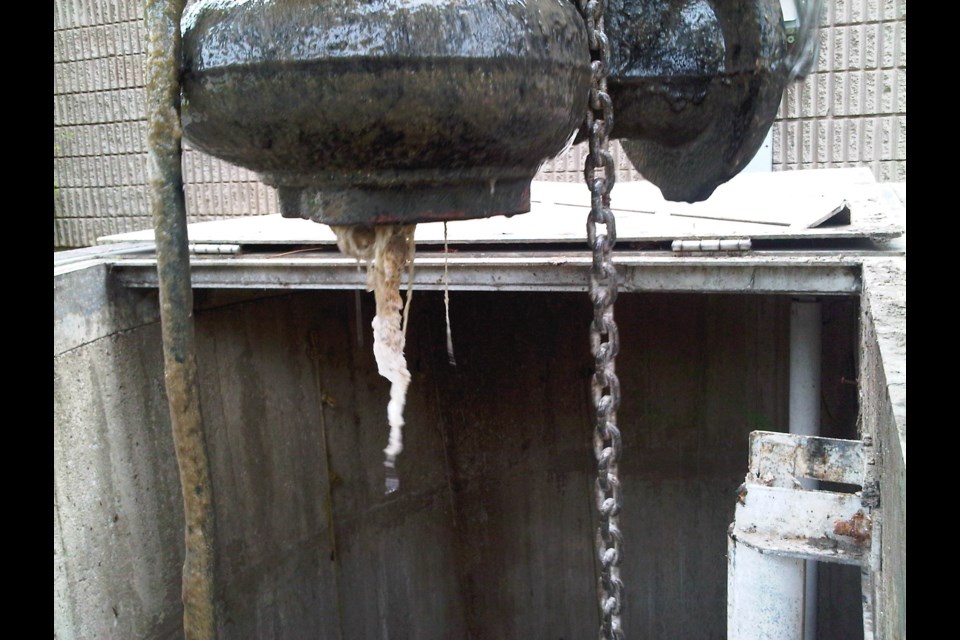Whether it is due to a shortage of toilet paper or an increase in disinfection, the Town of the Blue Mountains (TBM) is struggling with an onslaught of disposable wipes clogging up their wastewater treatment plant...again.
“These non-flushable wipes have been an ongoing issue at both of our facilities, both in Craigleith and Thornbury, but in the past few days we have seen a pretty significant increase of them in our system,” says Shawn Carey, director of operations for TBM.
As reported earlier this year, disposable wipes that are often labelled flushable or biodegradable are being flushed down the toilet, but do not break down in the system the way toilet paper does.
“We have definitely seen an increase and I am sure it is due to people increasing the disinfection they are doing around their home, which is something we don’t want to discourage at this time,” Carey says. “But we are asking residents to put those wipes in the garbage, even if they say they are flushable.”
Carey explains that when these wipes enter the system they do not break down and end up throughout the entire plant, forcing operators to close down certain portions of the facility and physically remove them.
“What is happening is they are causing blockages in the pipes, wrapping around pumps and they end up throughout the entire treatment system. Most products that come through we can manage to remove them at the screening level, but with these, they just block up the whole intake piece,” Carey says.
Tim Hendry, director of communications and economic development says the town has tried to communicate to residents about the repercussions of flushing these but operations continue to struggle with the issue.
“This is something the town has been dealing with for quite some time. We have tried different media campaigns and part of the challenge is the seasonality of our homeownership in the area,” Hendry says. “This year we have been extra aggressive with our marketing and promotions by including information in our tax bill and there will be another campaign coming in the next little while to educate people about the fact that these are not flushable.”
Carey says that not only is this an issue for the town but residents should take note, it can cause problems in residential plumbing as well.
“Not only does it hinder our operations but this can cause a lot of problems for private residents as well. If there is piping that is misaligned or something that they can catch on before reaching the town’s collection system, they can easily block someone's plumbing system,” Carey says. “We are urging residents to dispose of these properly. We need to cut this off at the source.”
Although this is an issue at both of the town’s wastewater facility plants, the problem is further escalated at the Thornbury Wastewater Treatment Plant due to a failing headworks facility.
“The headworks is the entire inlet or collection system into the wastewater treatment plant. It is where we have the grit separators and screens. That piece of equipment is failing and that is why we have a project right now to try and deal with that,” Carey says.
The TBM has been working on the Thornbury Wastewater Treatment Plant Headworks project for a number of years and recently the final tender for the construction phase of the project was closed. Staff hope to have shovels in the ground by May.
Carey says the failing headworks facility is certainly not helping the problem, but, “even if TBM had the new headworks building, these wipes would still be causing problems because they can essentially completely block the screens.”
“At this time in particular, this is an added issue we would prefer not deal with,” Carey says. “We certainly don’t want residents to run into issues on their own property and we don't need the added requirement of cleaning these out of our facilities when we need to be focused on the day-to-day operation of the plant.”
Residents are reminded they should only be flushing toilet paper, with no exceptions.
The town released the following list of items residents must not be flushing:
• Wipes of any kind, including those that claim to be “flushable”
• Hair
• Floss
• Pills/ Medication
• Paper Towels
• Cigarette Butts
• Cotton Balls, Pads & Swabs
• Tissues or Napkins
• Food Waste/ Dressings & Sauces
• Fats, Grease or Oil
• Paint and hazardous waste
• Cat Litter
• Bandages
• Fabric Items
• Deceased fish or pets
• Diapers
• Pads, Tampons and Applicators



